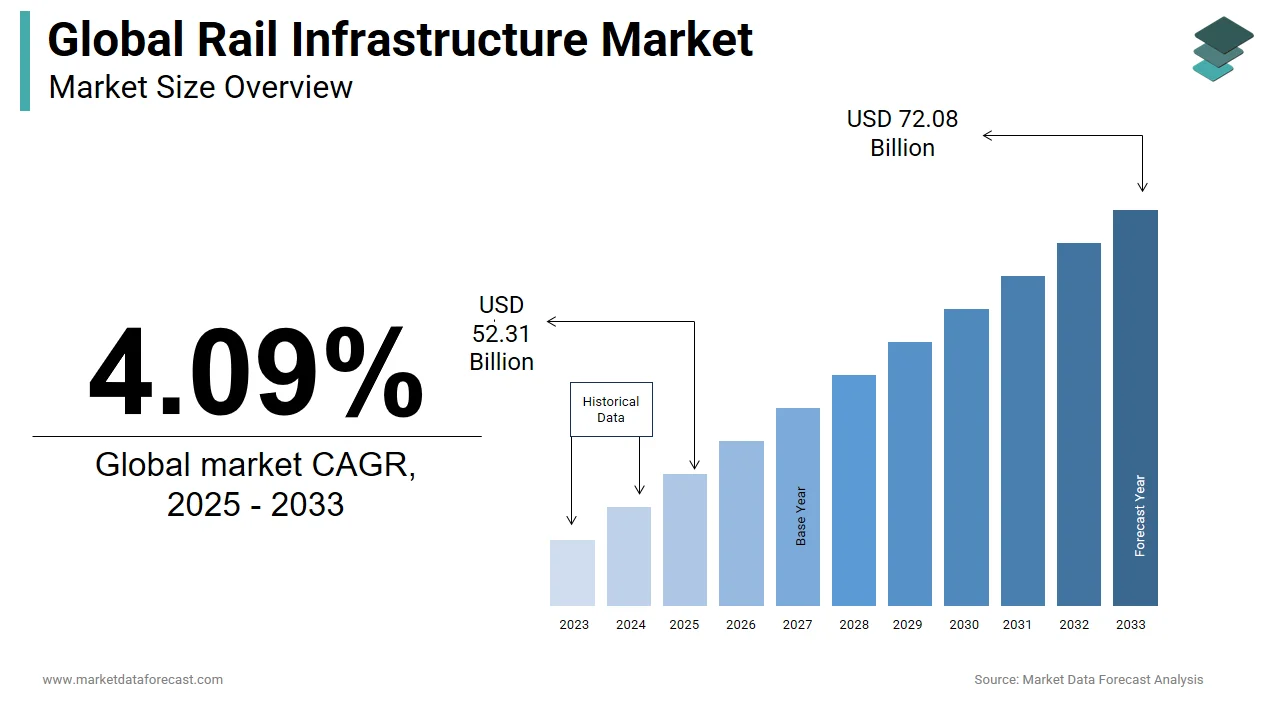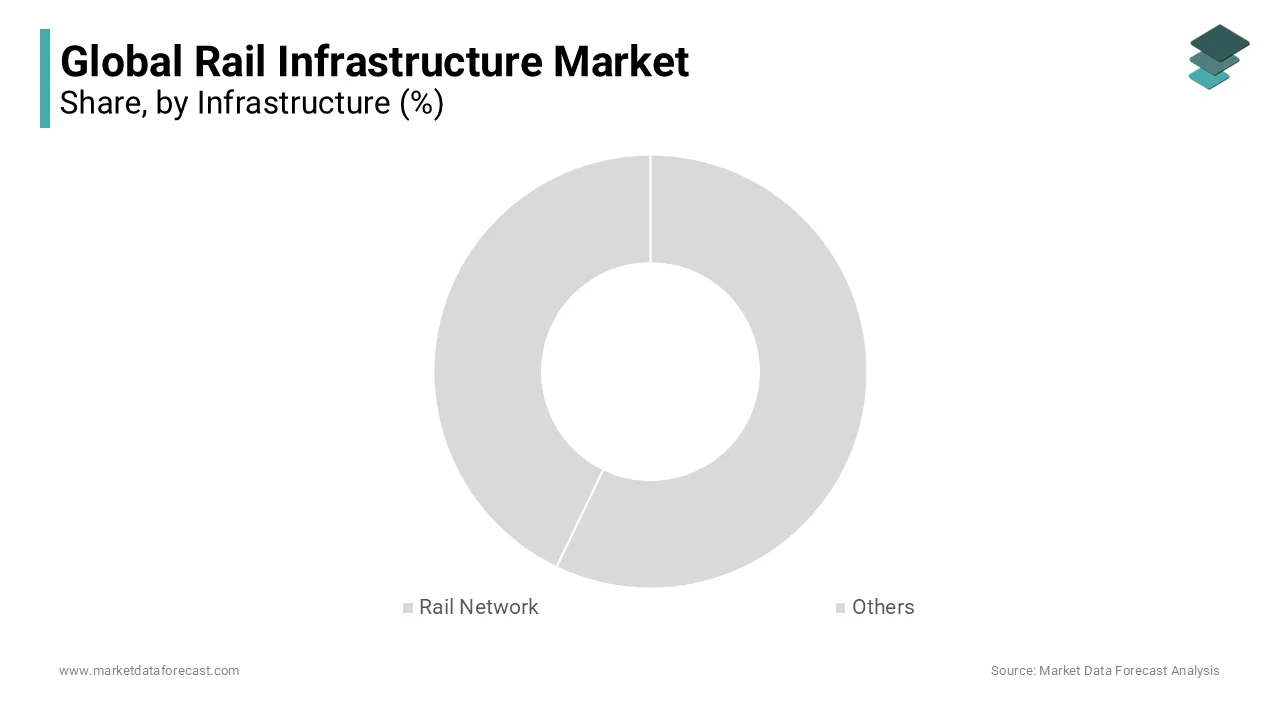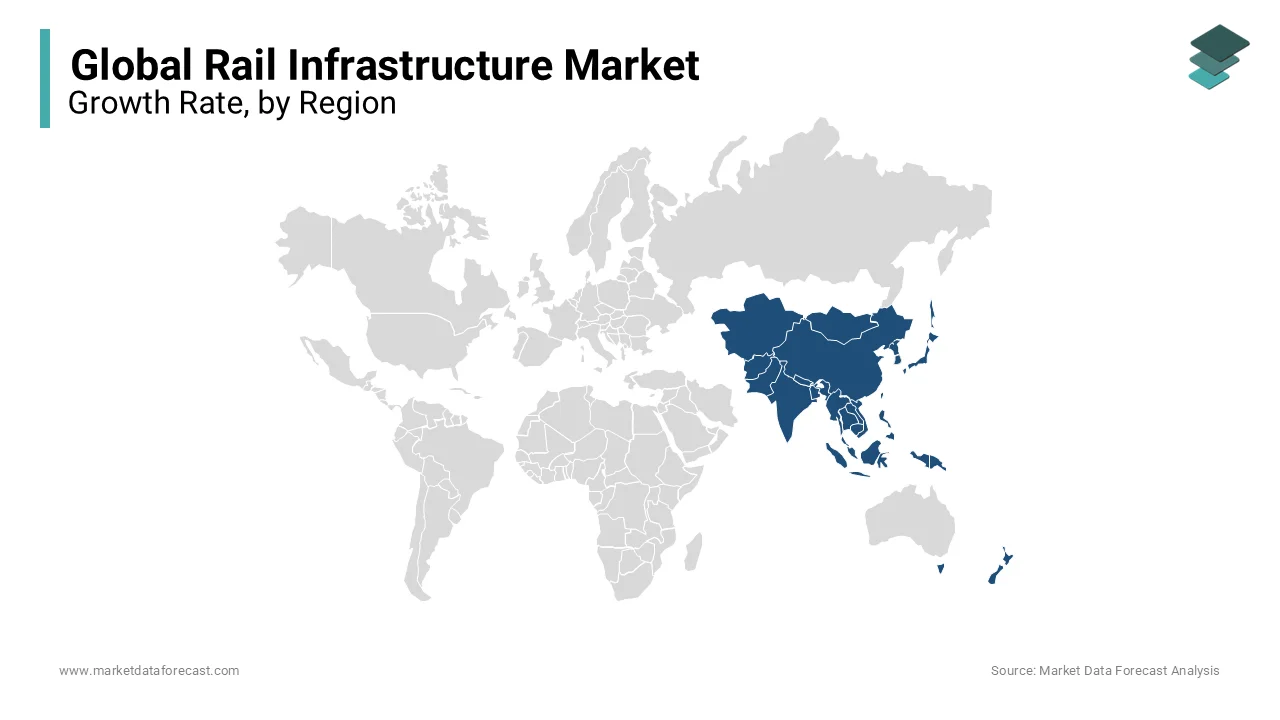Global Rail Infrastructure Market Size, Share, Trends, & Growth Forecast Report - Segmented By Infrastructure (Rail Network and Others), Type (Locomotive, Rapid Transit Vehicle and Railcar) & Region - Industry Forecast From 2024 to 2032
Global Rail Infrastructure Market Size (2024 to 2032)
The global rail infrastructure market was worth USD 48.28 billion in 2023. The global market is predicted to reach USD 50.25 billion in 2024 and USD 69.25 billion by 2032, growing at a CAGR of 4.09% during the projection period.

MARKET DRIVERS
The expansion of the rail infrastructure market can be associated with growing urbanization, increasing the need for cleaner, more efficient, faster transportation modes, and economic growth.
Furthermore, the increasing population growth rate has led to a surge in traffic and is creating a strong demand for additional rail infrastructure, therefore, driving the rail infrastructure market. Rail infrastructure is the foundation that supports the railway transport system. It links railway stations, ports, and airports. The railway system is a crucial driver of social and economic development that generates opportunities for the financially backward class and facilitates economic growth that increases competitiveness. Rail infrastructure helps connect individuals to jobs, health services, and education daily. It allows for the supply of goods and services globally. Currently, the rail infrastructure market is trying to adapt to the latest technologies. A rapidly growing population has led to a rise in traffic and a robust demand for other rail infrastructure. Nonetheless, many nations lack sufficient capital or space to build more roads and railways.
MARKET RESTRIANTS
Factors such as surging fuel prices, and shrinking resources, which have led to green transport popularity in several countries are hindering the growth of the rail infrastructure market. Moreover, electric vehicles, electric motorcycles, rail transport, and rapid mass transit are adopted.
REPORT COVERAGE
|
REPORT METRIC |
DETAILS |
|
Market Size Available |
2023 to 2032 |
|
Base Year |
2023 |
|
Forecast Period |
2024 to 2032 |
|
CAGR |
4.09% |
|
Segments Covered |
By Infrastructure, Type and Region |
|
Various Analyses Covered |
Global, Regional & Country Level Analysis, Segment-Level Analysis, DROC, PESTLE Analysis, Porter’s Five Forces Analysis, Competitive Landscape, Analyst Overview on Investment Opportunities |
|
Regions Covered |
North America, Europe, APAC, Latin America, Middle East & Africa |
|
Market Leaders Profiled |
GE Company, Bombardier Transportation, Alstom, Siemens, Kawasaki Heavy Industries, National Railroad Passenger Corporation, BNSF Railway Company, Norfolk Southern Corp, The Kansas City Southern Railway Company, and Union Pacific Railroad Company. |
SEGMENTAL ANALYSIS
Global Rail Infrastructure Market Analysis By Infrastructure

The rise in population in urban areas is estimated to fuel the rail network segment soon. An increase in rail traffic is expected to boost investments in rail and rail track maintenance.
Global Rail Infrastructure Market Analysis By Type
Locomotives are usually used to haul freight and passenger wagons for long-distance mainline transport. Nonetheless, vehicles such as metros, light rail vehicles, and subways are being used for intra-city and intercity transportation.
REGIONAL ANALYSIS

Asia-Pacific is estimated to lead the market growth due to the significant growing economies such as India, China, Japan, and South Korea. The region is experiencing considerable population growth. For instance, nations like China and India have a population of 1.38 billion and 1.31 billion, with the top two positions. The rolling stock industry in the region observes a rise in demand after a weak performance during the global recession. North America is witnessing a notable growth rate in the market for locomotives and rapid transit vehicles, positively impacting the rolling stock infrastructure industry. The strict fuel economy regulations in Europe are projected to be a significant market driver, as they will likely advance research to develop renewable energy use through new fuel and propulsion systems.
KEY MARKET PARTICIPENTS IN THE GLOBAL RAIL INFRASTRUCTURE MARKET
The major companies operating in the global rail infrastructure market include GE Company, Bombardier Transportation, Alstom, Siemens, Kawasaki Heavy Industries, National Railroad Passenger Corporation, BNSF Railway Company, Norfolk Southern Corp, The Kansas City Southern Railway Company, and Union Pacific Railroad Company. These players have adopted different strategies such as expansion and new product development to gain significant rail infrastructure market share. Bombardier Transportation has a comprehensive product portfolio that can meet both intercity and intracity transportation needs. It helps the company to supply application-specific transport solutions for cities based on existing infrastructure. The increasing demand for passenger rail in developing nations and additional services in developed countries will also offer new opportunities for the Germany-based company. The company has secured supply contracts for its products, which will help maintain a balanced revenue stream; however, Europe's changing economic scenario may affect future orders, as the majority of the company's revenue is derived from this region.
RECENT HAPPENINGS IN THE GLOBAL RAIL INFRASTRUCTURE MARKET
- In July 2018, Canadian National Railway invested around USD 315 million to expand and strengthen Ontario's rail infrastructure in 2018.
DETAILED SEGMENTATION OF THE GLOBAL RAIL INFRASTRUCTURE MARKET INCLUDED IN THIS REPORT
This research report on the global rail infrastructure market has been segmented and sub-segmented based on the infrastructure, type and region.
By Infrastructure
- Rail Network
- Others
By Type
- Locomotive
- Rapid Transit Vehicle
- Railcar
By Region
- North America
- The United States
- Canada
- Rest of North America
- Europe
- The United Kingdom
- Spain
- Germany
- Italy
- France
- Rest of Europe
- The Asia Pacific
- India
- Japan
- China
- Australia
- Singapore
- Malaysia
- South Korea
- New Zealand
- Southeast Asia
- Latin America
- Brazil
- Argentina
- Mexico
- Rest of LATAM
- The Middle East and Africa
- Saudi Arabia
- UAE
- Lebanon
- Jordan
- Cyprus
Frequently Asked Questions
What are the key drivers of the rail infrastructure market?
Key drivers include increasing urbanization, the need for efficient mass transit systems, government investments in infrastructure development, advancements in technology, and the rising demand for environmentally friendly transportation solutions.
What are the major challenges faced by the rail infrastructure market?
Major challenges include high initial capital investment, long project gestation periods, regulatory and environmental concerns, and the need for continuous maintenance and upgrades of existing infrastructure.
Which technologies are transforming the rail infrastructure market?
Technologies such as IoT (Internet of Things), AI (Artificial Intelligence), big data analytics, blockchain, and advancements in signaling and communication systems are transforming the rail infrastructure market, enhancing safety, efficiency, and passenger experience.
What are the future trends expected in the rail infrastructure market?
Future trends in the rail infrastructure market include the expansion of high-speed rail networks, increasing adoption of digital technologies, growth in intermodal transportation, and a focus on smart city initiatives integrating advanced rail systems. Additionally, there will be a continued emphasis on sustainability and green transportation solutions.
Related Reports
Access the study in MULTIPLE FORMATS
Purchase options starting from $ 2500
Didn’t find what you’re looking for?
TALK TO OUR ANALYST TEAM
Need something within your budget?
NO WORRIES! WE GOT YOU COVERED!
Call us on: +1 888 702 9696 (U.S Toll Free)
Write to us: [email protected]